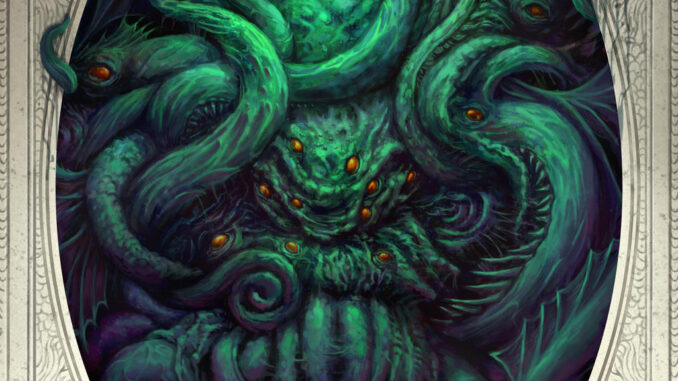
 When running a Call of Cthulhu game, we want our players to go too far, to discover forbidden lore… to even cast spells. Learning spells is a lengthy process that doesn’t conveniently fit into most campaigns. Even in Pulp Cthulhu play, it’s a major investment to learn how to make magic happen. Of course, there’s a major cost to performing the magic.
When running a Call of Cthulhu game, we want our players to go too far, to discover forbidden lore… to even cast spells. Learning spells is a lengthy process that doesn’t conveniently fit into most campaigns. Even in Pulp Cthulhu play, it’s a major investment to learn how to make magic happen. Of course, there’s a major cost to performing the magic.
Most of the time the spells are found in musty old tomes. First, the investigator needs to do a first pass reading of the material. After the initial reading, there’s a Cthulhu Mythos skill increase… followed by an equal amount of Sanity points permanently lost.
When I ran my Masks of Nyarlathotep campaign, each chapter was dedicated to a city or country where the investigators researched the story’s mysteries. In between chapters, there’s a long period of travel that’s encouraged to be handled like traveling by map in an Indiana Jones movie. This is the best chance for investigators to study the tomes they come across… but it provides nowhere near enough time to perform a full study.
After the initial read, it takes 2d6 weeks to learn a spell contained in the book. Then, the character attempts a Hard Intelligence roll to see if he truly mastered the spell.
A faster way to learn a spell is to have a Cthulhu Mythos entity teach the investigator. What could go wrong with Cthulhu communicating telepathically, teaching forbidden lore? The Keeper Rulebook suggests a minimum of 1d6 Sanity loss for the telepathy. That doesn’t take into consideration coming into contact with a Mythos entity, which promises the loss of even more Sanity points. When the process is complete, the investigator can make a regular Intelligence roll to see if he learned the spell.
To cast the spell, it will require an expenditure of Sanity points and Magic Points. Each spell lists how much of each are required. Then, a Hard Power roll is required to successfully cast the spell. If the roll is failed, the caster can make a decision whether he wants to push the roll to succeed (at the risk of many things going wrong if there’s another failure) or trying again at a later time. Trying again costs the Magic Points and Sanity Points for the second casting.
If the pushed roll is failed, the Keeper is allowed to have a party with the poor investigator. Blood comes out of his eyes. Animals within a mile radius suddenly get turned inside-out. A ring of fire surrounds the caster, burning off his hair.
In Pulp Cthulhu, you can read through Mythos tomes in half the time, allowing for more frequent usage of learning magic in your games.
Also, you can learn a spell in 1d6 hours. Then, a Hard Intelligence check is required to prove the caster truly learned the spell. In Pulp, the consequences of failing this roll include casting the spell on yourself or the spell functions differently than intended.
For casting the spell using Pulp rules, a Power roll is only required the first time the spell’s cast. Even if the roll had to be pushed, it’s assumed the caster learned enough to be able to cast the spell flawlessly on future attempts. For failed pushed castings, there’s a whole table of nasty things that can happen to the hero as a result of messing with powers beyond his ken.
There is an optional rule in Pulp Cthulhu for making magic deadlier. It suggests whenever a spell is cast, it’s treated as if the first roll is the pushed roll. If things go badly, there are horrible consequences with no chance of pushing the roll for a success.
The rules for learning spells from tomes can be a bit confusing, but if encouraged (giving the investigator enough rope to hang himself) with, can bring some fun and chaos into a Call of Cthulhu game.
